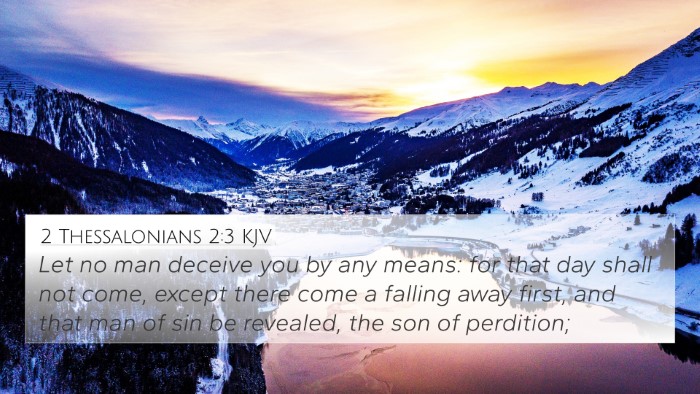Understanding Jeremiah 37:9
Jeremiah 37:9 states: "Thus saith the Lord; Deceive not yourselves, saying, The Chaldeans shall surely depart from us: for they shall not depart." This verse emphasizes the importance of listening to God's warnings and the futility of self-deception. In this passage, Jeremiah warns the people of Jerusalem against the false hope provided by their leaders, who misleadingly suggested that the threat from the Chaldeans would soon dissipate.
The primary message here is that trusting in false security can lead to disastrous consequences. The people are encouraged to accept their current situation while acknowledging divine judgment. The prophet serves as a mouthpiece for God, stating that the Chaldeans are not going to withdraw, directly conflicting with the beliefs held by the people.
Commentary Insights
-
Matthew Henry:
According to Henry, this verse underscores the gravity of continuing faith in God's promises amidst adversity. It advises against believing false prophets who propagate a message contrary to God's truth. Becoming complacent can lead to spiritual and physical ruin.
-
Albert Barnes:
Barnes elaborates that the hope of the people in Jerusalem was misplaced. The verse serves as a stark reminder that God’s judgment is inevitable. The Chaldeans represent both a literal and spiritual threat, and trusting in human assurances rather than divine wisdom is perilous.
-
Adam Clarke:
Clarke points out that the phrase "deceive not yourselves" indicates a profound self-delusion prevalent among the people. His commentary reflects on the historical context, highlighting the seriousness of the Chaldean siege and the spiritual blindness of the leaders and citizens alike.
Cross-References
Several verses throughout the Bible cross-reference Jeremiah 37:9, illustrating its themes of false hope and divine truth:
- Isaiah 30:10 - "Which say to the seers, See not; and to the prophets, Prophesy not unto us right things, speak unto us smooth things, prophesy deceits." - This highlights the desire for comforting lies over harsh realities.
- Jeremiah 14:13 - "Then said I, Ah, Lord God! behold, the prophets say unto them, Ye shall not see the sword, neither shall ye have famine; but I will give you assured peace in this place." - Reflects the common theme of false prophecies.
- Ezekiel 13:10 - "Because, even because they have seduced my people, saying, Peace; and there was no peace." - A warning against false prophets who preach safety when judgment is impending.
- Matthew 24:11 - "And many false prophets shall rise, and shall deceive many." - Jesus warns of future deceptive teachings.
- Micah 3:5 - "Thus saith the Lord concerning the prophets that make my people err, that bite with their teeth, and cry, Peace; and he that putteth not into their mouths, they even prepare war against him." - Illustrates the consequences of false security preached by leaders.
- 2 Peter 2:1 - "But there were false prophets also among the people, even as there shall be false teachers among you, who privily shall bring in damnable heresies." - Highlights the continuous presence and danger of false teachings.
- Romans 16:18 - "For they that are such serve not our Lord Jesus Christ, but their own belly; and by good words and fair speeches deceive the hearts of the simple." - A warning on the dangers of persuasive yet untrue words.
Thematic Connections
The themes present in Jeremiah 37:9 resonate throughout Scripture, presenting a continuous narrative on the integrity of prophetic truth, the dangers of deception, and the necessity of recognizing divine authority.
- Trust in God versus Human Assurance: Many verses, like Proverbs 3:5-6, reinforce the idea that reliance on God is fundamentally important.
- The consequences of False Prophecies: As seen in verses like Matthew 7:15-20, true fruits of the Spirit distinguish genuine prophets from false ones.
- Divine Judgment: The repeated calls for repentance throughout Jeremiah and the entirety of Scripture serve as grounding reminders of accountability before God.
Conclusion
Understanding Jeremiah 37:9 involves recognizing the historical, spiritual, and prophetic layers present in the text. The verse serves as a cautionary tale, calling believers to be vigilant against deception, aligning their trust not with mere human assurances but firmly with God's omnipotent guidance. Thus, engaging in cross-referencing Biblical texts provides a deeper insight into similar themes across the Scripture, promoting a richer and more comprehensive understanding of the word of God.










